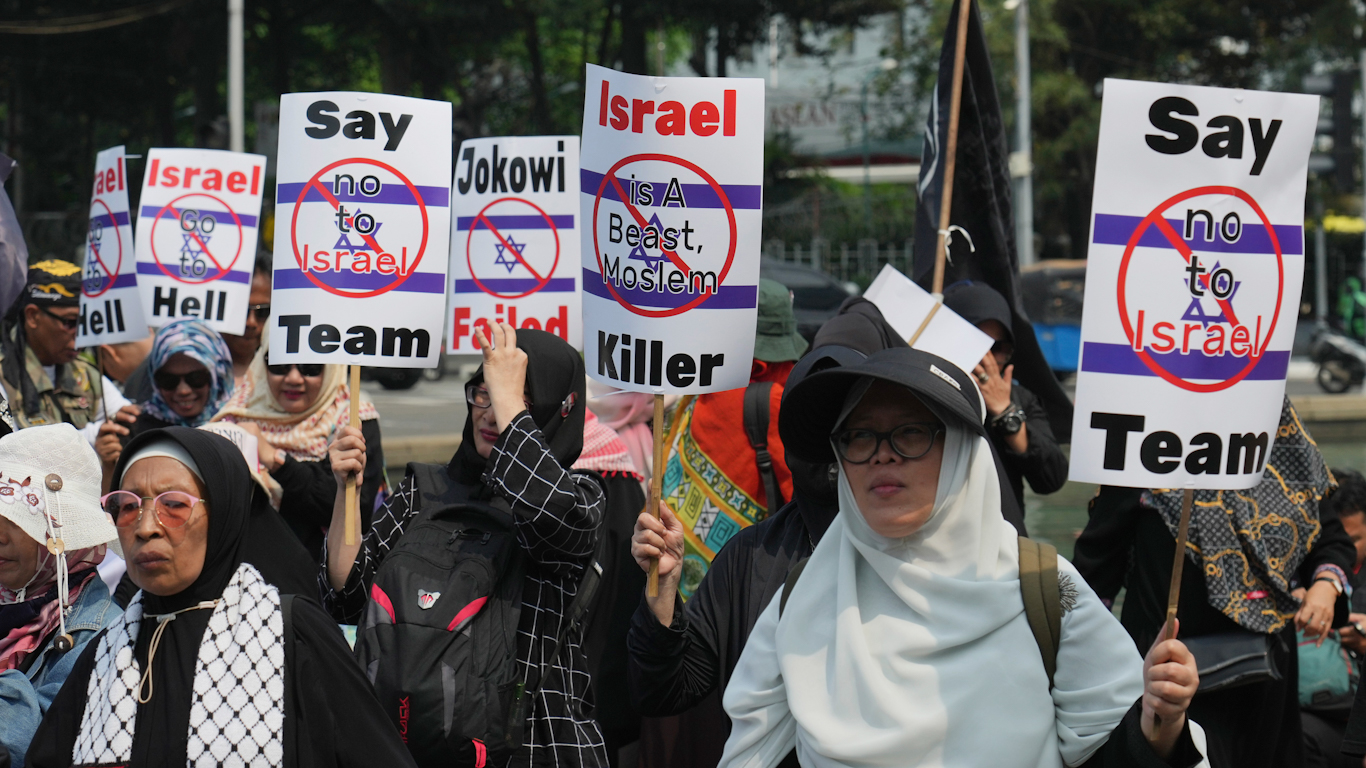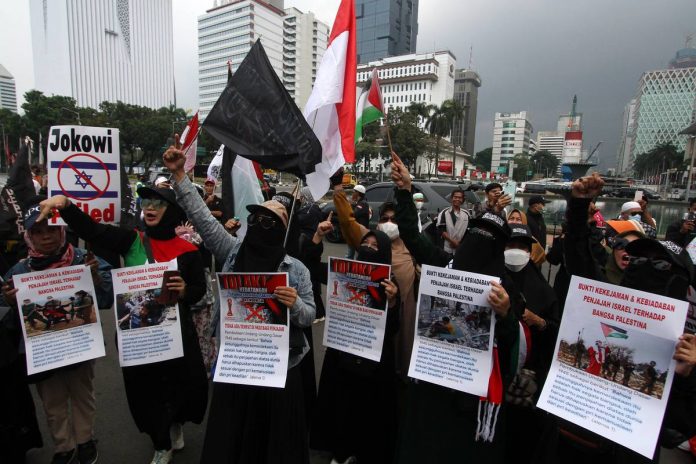Some readers were unimpressed when I excitedly shared the news on social media that Indonesia had refused to host the Israeli team as part of the Under-20 World Cup, scheduled from May 20 to June 11 in Indonesian cities.
Though any news related to Palestine and Israel often generates two sharply different kinds of responses, the latest act of Indonesian solidarity with the Palestinian people failed to impress even some pro-Palestine activists in the West. Their rationale had nothing to do with Palestine or Israel but the Indonesian government’s own human rights record.
This supposed dichotomy is as omnipresent as it is problematic. Some of the most genuine acts of solidarity with the Palestinians – or other oppressed nations in the Global South – tend to occur in other Southern nations and governments. But since the latter are frequently accused of poor human rights records by Western governments and West-based rights groups, these gestures of solidarity are often questioned as lacking substance.
Aside from the weaponization of human rights – and democracy – by Western governments, some of the concerns about human rights violations are worth a pause: can those who do not respect the rights of their own people be trusted to champion the rights of others?
The Lack of Self-Awareness
Though intellectually intriguing, the argument, and the question, lack self-awareness, reek of entitlement, and reflect a poor understanding of history.
First, the lack of self-awareness. In the West, advocacy for Palestinian rights is predicated on reaching out, educating and lobbying some of the world’s most destructive colonial and neocolonial powers. This advocacy includes civil engagement with countries that have, for example, invaded Iraq and Afghanistan, tormented Africa and continue to subjugate many nations in the Global South.
These Western governments were also the ones who either handed the deed of Palestine – Britain – to the Zionist movement or sustained Israel militarily, financially and politically for generations – the US and others.
Even though little tangible progress has been recorded regarding substantive political shifts away from Israel, we continue to engage with these governments with the hope that a change will come.
Rarely do Western activists make arguments similar to those made against Indonesia – or other Asian, African, Arab or Muslim countries. Personally, never once have I been reminded of the moral conflict of pursuing solidarity from Western governments that have long invested in the oppression of the Palestinian people.
The Entitlement
Second, the entitlement. For many years and, particularly since the end of World War II, western governments endeavored to serve the roles of judge, jury and executioner. They drafted international law yet selectively implemented it. They passed the Human Rights Declaration yet selfishly determined who deserves this humanity. They launched wars in the name of defending others, yet left in their wake more death and mayhem than existed prior to these ‘humanitarian interventions.’
Some human rights activists in the West rarely appreciate that their influence is primarily derived from their very geographic position and, more importantly, citizenship. This is why Hannah Arendt rightly argued that individuals could only enjoy human rights once they obtain the right to be citizens of a nation-state. “Human rights lose all their significance as soon as an individual loses her political context,” she wrote in her seminal book, The Right to Have Rights.
Though some activists have paid a heavy price for their genuine solidarity with the Palestinian people, others understand solidarity in purely conceptual terms, without considering the numerous political obstacles and, sometimes, compromises an occupied nation faces.

The fact that Palestinian civil societies launched the Boycott, Divestment and Sanctions Movement in 2005, in that particular order, reflects the awareness among Palestinians that it will take more than individual acts of solidarity to end the Israeli occupation and to dismantle Israeli apartheid. Divestment means that companies that benefit from the Israeli occupation must sever their ties with Israel – even if some of these companies may have questionable practices.
The same logic applies to sanctions, which require a strong political will by governments to ostracize Tel Aviv until it ends its occupation, respects international law and treats Palestinians as equal citizens.
If having a perfect human rights record is a prerequisite for government support, not many countries, if any, will qualify. Oppressed people simply cannot be so entitled, as they do not have the privilege or the leverage to shape a perfectly harmonious global solidarity.
A Better Understanding of History
Finally, the need for a better understanding of history. Before the signing of the Oslo Accords between the Palestinian leadership and Israel in 1993, the term ‘human rights’ was an important component of the Palestinian struggle. But it was neither the only nor the main driving force behind the Palestinian quest for freedom. For Palestinians, all aspects of Palestinian resistance, including the pursuit of human rights, were parts of a larger liberation strategy.
Oslo changed all of that. It shunned such terms as resistance and redefined the Palestinian struggle from that of liberation to human rights. As a result, the Palestinian Authority respected its assigned task, and many Palestinians played along simply because they felt they had no other alternative.
Yet, by elevating the human rights discourse, Palestinians were entrapped in entirely Western priorities. Their language, which, in the past, was consistent with revolutionary lessons of anti-colonial movements in the Middle East, Africa and the rest of the Global South, was rejigged to appeal to Western expectations.
This should not suggest that anti-colonial movements did not champion human rights discourses. On the contrary, such lessons were at the core of millions of people’s valiant struggles and sacrifices worldwide. But for them, human rights was not an isolated moral position nor a political stance to be used or manipulated to highlight the moral superiority of the West over the rest or to sanction poor countries, often for the sake of exacting political or economic concessions.
Palestinians care deeply about the human rights of other nations. They ought to because they have experienced firsthand what it means to be stripped of their rights and humanity. But, also, they are in no position, nor should they seek one that would allow them to condition solidarity from others on the West’s politicized human rights agendas.
Feature photo | Indonesian soccer fans light candle during a rally expressing their disappointment at the removal of the country as the host of FIFA U-20 World Cup, in Jakarta, Indonesia, Tuesday, April 4, 2023. Photo | AP
Dr. Ramzy Baroud is a widely published and translated author, an internationally syndicated columnist and editor of PalestineChronicle.com. His latest book is The Last Earth: A Palestinian Story (Pluto Press, 2018). He earned a Ph.D. in Palestine Studies from the University of Exeter (2015), and was a Non-Resident Scholar at Orfalea Center for Global and International Studies, UCSB. Visit his website at www.ramzybaroud.net.
The post The Price of Solidarity: Palestine, Indonesia and the Entitlement of Western “Human Rights” Activism appeared first on MintPress News.
